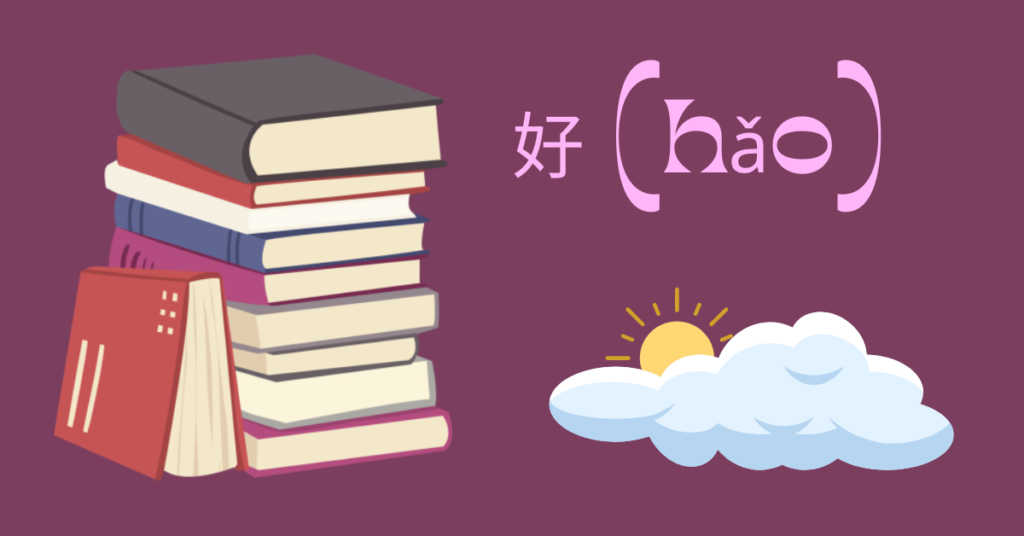
Here’s a detailed explanation of the common Chinese grammar pattern 好 (hǎo) meaning ‘pleasant’, along with examples:
好 (hǎo) meaning ‘pleasant’:
Usage: 好 (hǎo) is an adjective commonly used in Chinese to describe something as ‘good’, ‘nice’, ‘pleasant’, or ‘favorable’. It can be used to express positive feelings or opinions about a person, thing, or situation.
- Example 1: 这是一个好消息! (Zhè shì yīgè hǎo xiāoxi!) – “This is good news!”
- Example 2: 你的中文说得真好! (Nǐ de Zhōngwén shuō de zhēn hǎo!) – “You speak Chinese really well!”
- In these examples, 好 (hǎo) is used to convey a positive or pleasant quality or experience.
This pattern is commonly used in Chinese to express favorable or positive opinions. It can describe the quality of something, the outcome of a situation, or a general sense of goodness.
Here are a few more examples:
- 这是一本好书,我推荐给你! (Zhè shì yī běn hǎo shū, wǒ tuījiàn gěi nǐ!) – “This is a good book, I recommend it to you!”
- 今天的天气真好,我们去户外活动吧! (Jīntiān de tiānqì zhēn hǎo, wǒmen qù hùwài huódòng ba!) – “The weather is really nice today, let’s go outdoors and do some activities!”
By using 好 (hǎo) to mean ‘pleasant’ or ‘good’, you can effectively express positive opinions, describe favorable qualities, or convey a sense of enjoyment in Chinese. It adds a positive and optimistic tone to the statement or description.
Dialogue
Person A: 你今天感觉怎么样?(Nǐ jīntiān gǎnjué zěnmeyàng?) – How do you feel today?
Person B: 我感觉很好,天气很晴朗。(Wǒ gǎnjué hěn hǎo, tiānqì hěn qínglǎng.) – I feel good, the weather is very sunny.
Person A: 那太好了!我们一起去公园散步吧。(Nà tài hǎole! Wǒmen yīqǐ qù gōngyuán sànbù ba.) – That’s great! Let’s go for a walk in the park together.
Person B: 好主意!我喜欢户外活动。(Hǎo zhǔyì! Wǒ xǐhuān hùwài huódòng.) – Good idea! I enjoy outdoor activities.
Person A: 公园里的花很漂亮,我们可以拍照留念。(Gōngyuán lǐ de huā hěn piàoliang, wǒmen kěyǐ pāizhào liúniàn.) – The flowers in the park are beautiful, we can take photos as keepsakes.
Person B: 好的,我带上相机。(Hǎo de, wǒ dài shàng xiàngjī.) – Alright, I’ll bring the camera.
Explanation
In this dialogue, Person A asks Person B how they feel today using the phrase “你今天感觉怎么样.” Person B responds by saying they feel good and mentioning the sunny weather with the phrase “我感觉很好,天气很晴朗.”
Person A expresses excitement and suggests going for a walk in the park together with the phrase “我们一起去公园散步吧.” Person B agrees and shares their enjoyment of outdoor activities with the phrase “我喜欢户外活动.”
Person A highlights the beauty of the flowers in the park and suggests taking photos as keepsakes with the phrase “公园里的花很漂亮,我们可以拍照留念.” Person B agrees and confirms that they will bring the camera with the phrase “好的,我带上相机.”
This dialogue showcases the usage of “好 (hǎo)” to express feeling good or pleasant, as well as the usage of various phrases to suggest activities and share preferences.
Exercise
- Create your own sentence(s) using 好 (hǎo).